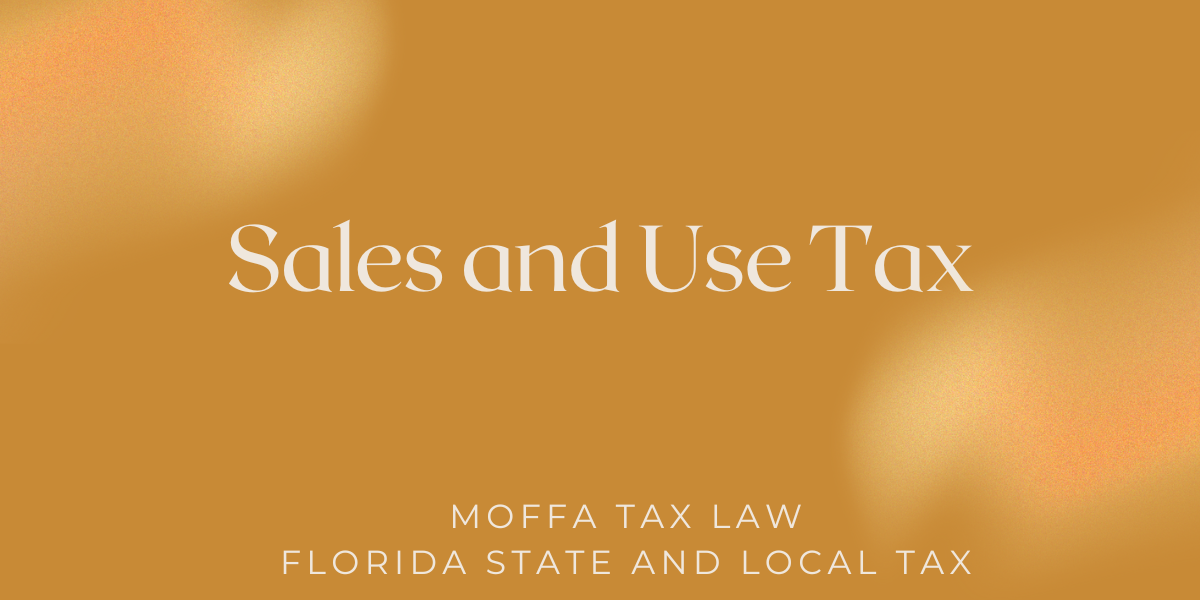NEWS & INSIGHTS


Navigating Florida’s sales and use tax system isn’t getting any easier. The Florida Department of Revenue sales tax rules have always required attention to detail, but recent enforcement trends, legislative changes, and evolving interpretations are making compliance more critical than ever—especially for multistate and digital businesses.
Whether you’re a retailer, service provider, manufacturer, or operating an online platform, here’s a breakdown of what you should know right now.
1. Sales Tax Isn’t Just for Goods Anymore
Traditionally, Florida’s sales tax applied mainly to tangible personal property (TPP), but that landscape is changing. The Florida Department of Revenue (FDOR) has expanded its focus to taxable services, especially in areas like:
Commercial cleaning
Security services
Nonresidential pest control
Detective and investigation services
Many businesses don’t realize they’ve crossed into taxable territory until an audit is underway.
Tip: If you provide a mix of products and services, review your invoices and service agreements to ensure they clearly separate taxable and nontaxable items.
2. Remote Sellers: Economic Nexus Still Matters
Since the 2018 Wayfair decision, Florida has implemented economic nexus standards. As of July 1, 2021, remote sellers making over $100,000 in Florida sales in the prior calendar year must register, collect, and remit Florida sales tax.
If you sell into Florida and haven’t evaluated your sales thresholds recently, now is the time. The Department has stepped up enforcement through data matching and audits.
Tip: Don’t forget that third-party marketplace sellers are covered too—platforms like Amazon and Etsy are now responsible for collecting tax on behalf of sellers, but direct sales off your website may still trigger obligations.
3. Audits Are Getting Smarter
FDOR’s audit program is increasingly data-driven. With enhanced technology and third-party data access, the Department is better at identifying businesses with potential sales tax liabilities—even those without physical operations in the state.
Auditors are particularly interested in:
Out-of-state sellers with Florida customers
Contractors buying untaxed materials
Companies misusing resale certificates
Tip: Make sure your exemption certificate process is current, and be wary of relying on old or incomplete certificates. Florida requires timely and properly executed documentation.
4. Leases, Rentals, and Real Property Rules Remain Unique
Florida is one of the only states that imposes sales tax on commercial rent—a persistent trap for businesses leasing office or retail space. As of 2024, the state rate is reduced to 4.5% (plus local surtax), but many landlords and tenants still overlook proper collection and remittance.
The Department continues to enforce this aggressively, and incorrect treatment could leave either party on the hook for significant liabilities.
Tip: Double-check your lease contracts—landlords must collect and remit the tax, and tenants should verify it’s being handled correctly. Subleases and CAM charges may also be subject to tax.
5. Digital Goods and Cloud Services: Still a Gray Area
Florida does not have a comprehensive policy taxing digital goods and cloud-based services, but interpretations vary depending on the nature of the transaction. The Department has held that downloaded software is generally taxable, while SaaS (software as a service) may not be—unless it crosses into the territory of a rental of tangible personal property.
As the Department updates its Technical Assistance Advisements (TAAs), businesses offering digital services or software should carefully analyze the transaction structure.
Tip: Be prepared to explain what you’re selling—licensing rights, downloads, access fees, and maintenance charges may all be treated differently.
6. The Importance of Discretionary Sales Surtax Rates
Florida counties can levy discretionary surtaxes on top of the state’s 6% rate. These vary widely by jurisdiction and often change annually. The Department publishes a surtax chart every year, but many businesses fail to update their tax software or point-of-sale systems to reflect current rates.
Tip: Always check for local surtax updates at the beginning of each year—and if you ship goods into multiple counties, make sure you’re sourcing tax based on the correct location.
Final Thoughts
The Florida Department of Revenue sales tax system can be deceptively complex, especially for businesses that operate across state lines, offer mixed products and services, or rely on digital platforms. As Florida continues modernizing its enforcement and updating interpretations, businesses must stay proactive.
If you’re unsure whether your current practices meet Florida’s requirements, consider conducting a self-review or speaking with a Florida sales tax professional. Small mistakes can turn into big assessments—and the Department isn’t slowing down.
© 2025 Jeanette Moffa. All Rights Reserved.
Share
Additional Articles by the SALTy Orange at Moffa Tax Law:
NEWS & INSIGHTS Inside the FTA’s May 2025 Committee Report: What State Tax Officials Are Watching Inside the FTA’s May…
NEWS & INSIGHTS State Conformity with the BBA Partnership Audit Rules: Where Are We in 2025? State Conformity with the…
How Florida’s Sales Tax Auditors Target Convenience Stores (and What You Can Do About It)”
NEWS & INSIGHTS How Florida’s Sales Tax Auditors Target Convenience Stores (and What You Can Do About It) Florida Department…

Jeanette Moffa, Esq.
(954) 800-4138
JeanetteMoffa@MoffaTaxLaw.com
Jeanette Moffa is a Partner in the Fort Lauderdale office of Moffa, Sutton, & Donnini. She focuses her practice in Florida state and local tax. Jeanette provides SALT planning and consulting as part of her practice, addressing issues such as nexus and taxability, including exemptions, inclusions, and exclusions of transactions from the tax base. In addition, she handles tax controversy, working with state and local agencies in resolution of assessment and refund cases. She also litigates state and local tax and administrative law issues.


